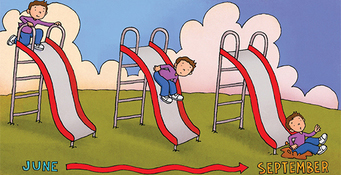Anirudh Week 14: The "Summer Slide"
When we returned to school (unfortunately) from spring break on Monday, I heard from several of my peers that they had forgotten much of the content they had learned before the break. Since many students did minimal studying during breaks—which is understandable because breaks are intended to offer a respite from work—they tended to forget a substantial amount of information.
This got me thinking about an assignment that I did back in fifth grade. We were paired up with another student and were tasked with producing a debate over a certain topic. Within each pair, we took opposing sides of the debate and had to write an argumentative essay as well as create a slideshow to prove that our side was better than the other. For me and my partner, we debated the traditional school calendar versus the year-round school calendar, with me arguing the latter.
Year-round school has a different calendar for the school year that contains shorter and more frequent breaks but runs throughout the year. Summer break is cut short, but spring break is extended and a two-week long fall break is included.
A significant argument from my side was the idea of the “summer slide.” Essentially, this concept illustrates the loss of knowledge caused by the long summer break. Students are away from academics for months, resulting in much of the school content fading from their minds. As a result, teachers are forced to review—sometimes for an entire month—everything from the previous year before they can move on to the new lessons.
In my argument, I highlighted that the effects of the summer slide are less severe with the adoption of a year-round school calendar. The shorter breaks reduce the chances of students forgetting the things they learned, which allows the school to be more efficient.
Although I did choose this side to argue for, I would still prefer the calendar that we currently have. The prospect of summer break, especially toward the end of the year, serves to motivate me to finish out the school year on a strong note. I know that if I can get through that last month, I will have an abundance of free time to relax and do anything that I want.
The summer slide is a dangerous effect that should be avoided, but I do not believe that drastically changing the school calendar is the optimal method to do so.



Hi Anirudh,
ReplyDeleteYour blog post offers a thought-provoking reflection on the impact of breaks on students' retention of knowledge, and I appreciate your insight into the "summer slide" phenomenon. Your fifth-grade debate experience sounds like a valuable learning opportunity, where you explored the benefits of a year-round school calendar in mitigating the effects of learning loss. It's inspiring to see your critical thinking skills in action as you presented arguments for shorter, more frequent breaks to maintain academic momentum. Your acknowledgment of the motivation that summer break provides toward the end of the school year resonates deeply, highlighting the importance of balance in educational calendars. Your balanced perspective on the issue demonstrates maturity and an understanding of the complexities involved in addressing the summer slide. Overall, your blog post encourages readers to consider alternative approaches to tackling learning loss while also cherishing the joys of traditional school breaks.
Hi Anirudh! I enjoyed your informative and very interesting blog post about a very relatable topic considering we all have just come back from Spring break. I specifically enjoyed your usage of an anecdote to introduce the topic of the blog which is very interesting considering you are writing about a memory on the investigation of memory loss of students depending on the structure of a school schedule. I recall, either during late elementary school or middle school, the Fremont Unified School district was heavily considering switching all FUSD schools to a year long schedule; however, after months of debates and deliberation, the decision was ultimately made to stick to the current schedule format which includes the long summer break. I personally agree with your assessment as considering we are very blessed and lucky to live in the bay area, students here are presented with many educational opportunities to pursue during the long summer break to gain valuable experience either for preparation for college or their future line of work. However, for areas of America which unfortunately do not have the same access to technology and these cutting edge opportunities, I would have to reconsider as I find if one does not keep themselves busy during summer break, it can become very monotonous and quite depressing. Thank you for sharing your experiences!
ReplyDeleteHi Anirudh! What a thought-provoking reflection on the dynamics of memory retention and its implications for education! I appreciate how you ease the reader into the text with a scenario that applies to all of us. Not only does it demonstrate your expertise in engaging your audience but it also shows that you are well-informed about readers’ interests and feelings. Personally, I resonated with your claim about forgetting information over break, so I was curious to read on and learn what you had to say. Then, you take us back a few years to a particular moment in time during elementary school. One suggestion I have is focusing less on the specifics and more on the feel of the moment; in addition, I feel you could be a little less formal per se, because words like “highlight” and “illustrates” do not not really flow well in the context of describing your younger self. Nevertheless, you comprehensively detail your choice for the nontraditional calendar. I am much more in support of the traditional school calendar with a long summer break, because like you mention, it provides motivation to finish the year—there is something to look forward to. On the other hand, without a summer, I would feel trapped in an endless cycle. I even foresee immense levels of stress and anxiety in students, which essentially defeats the purpose of such a schedule.
ReplyDelete